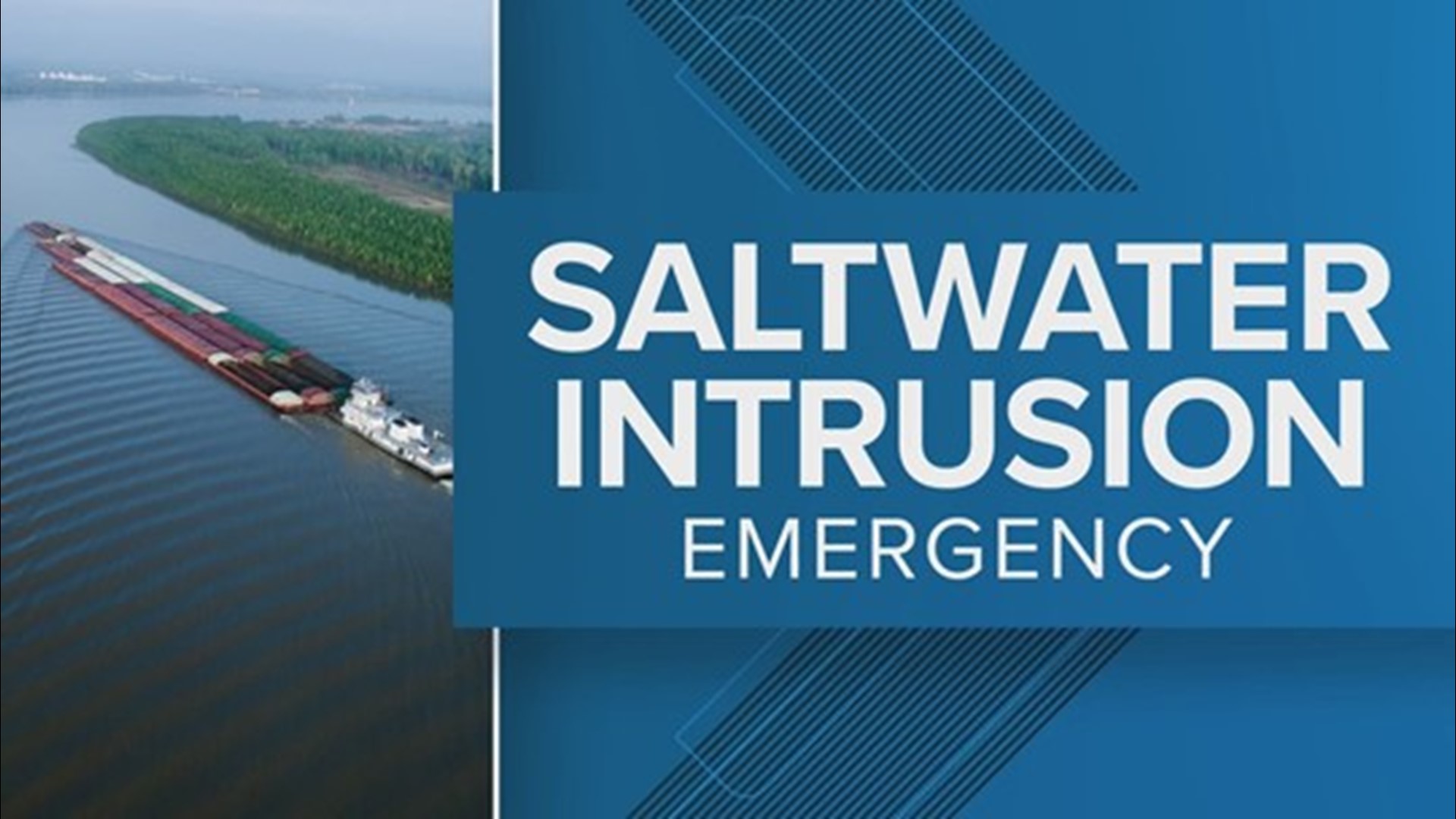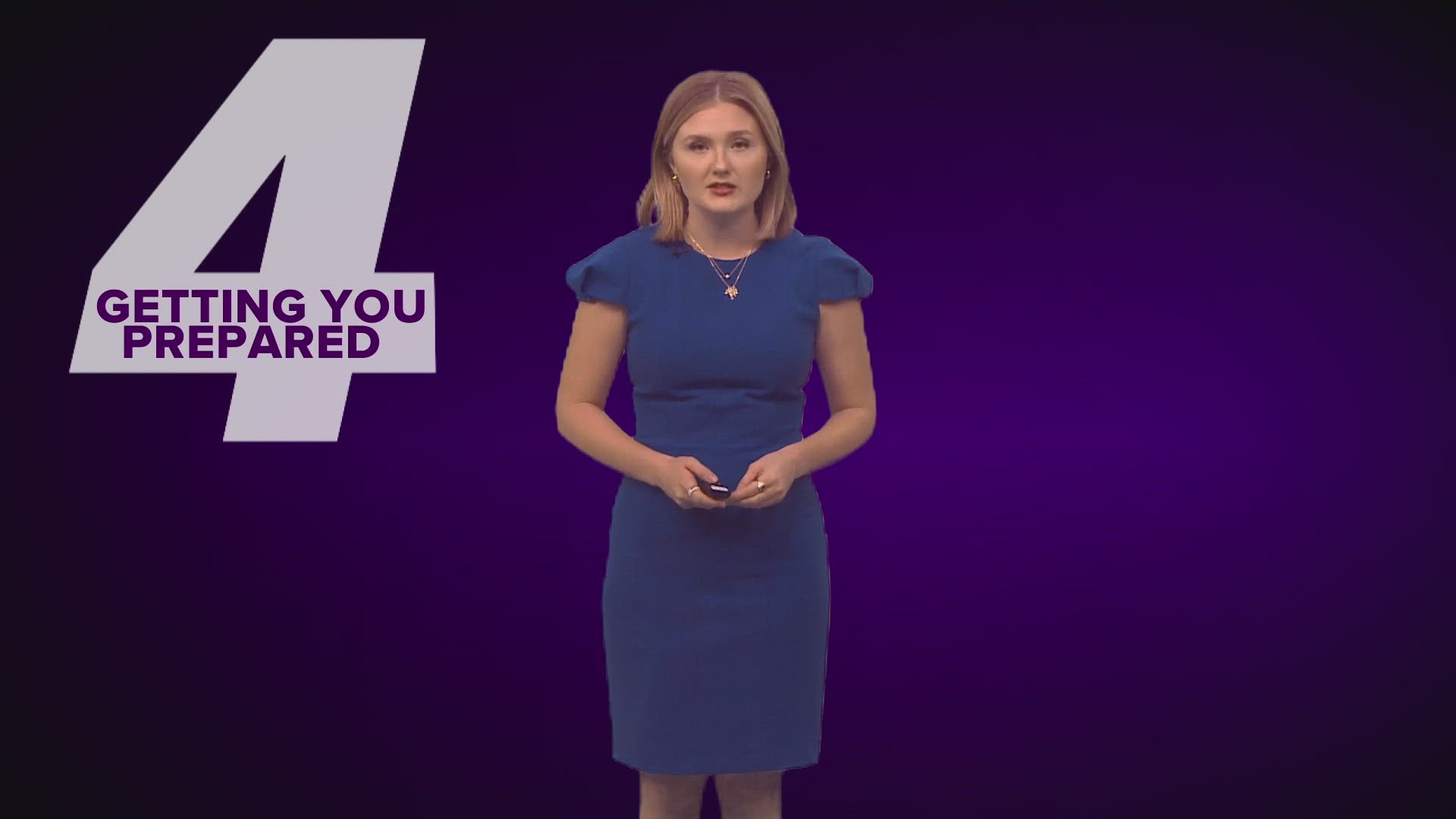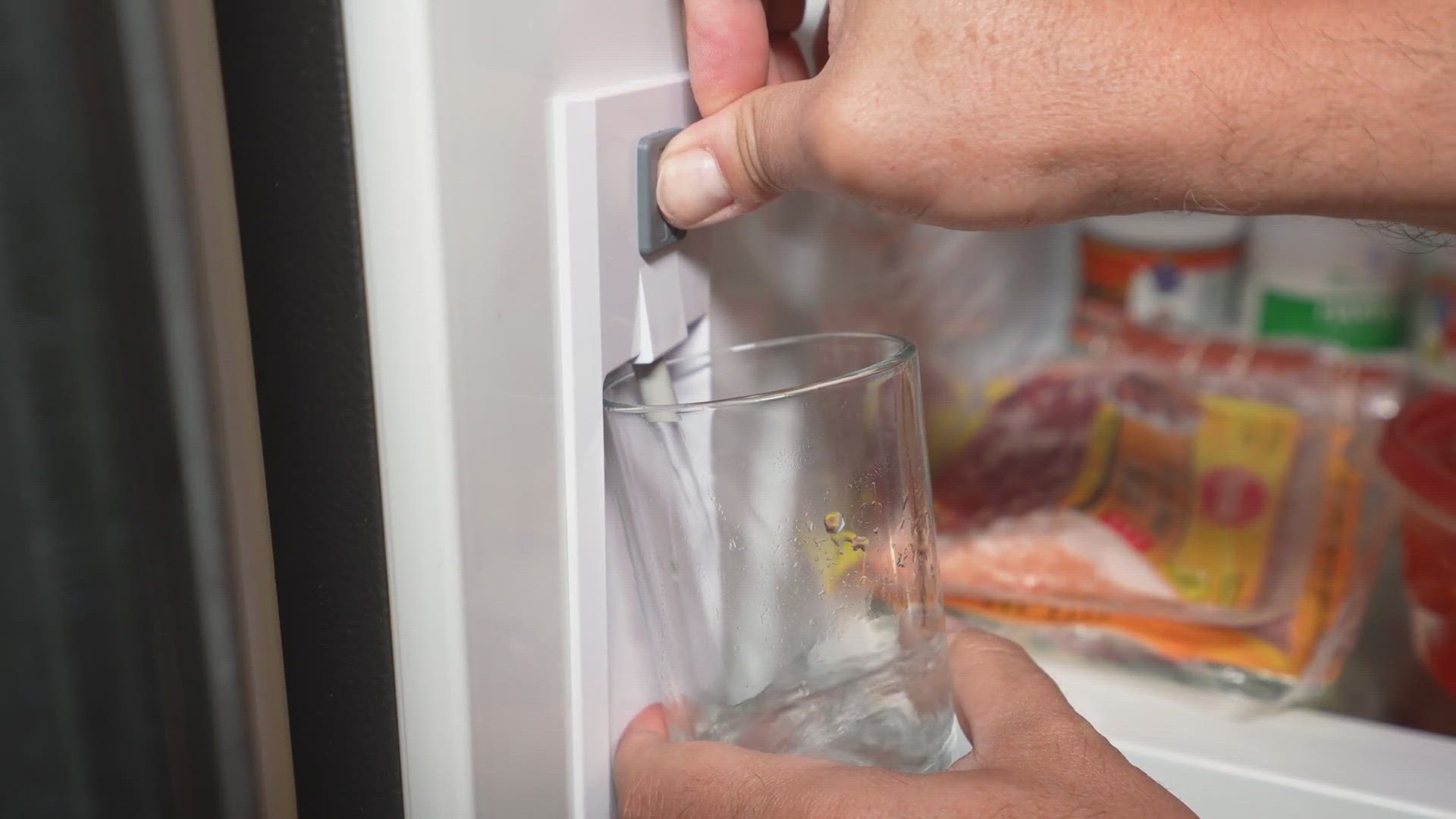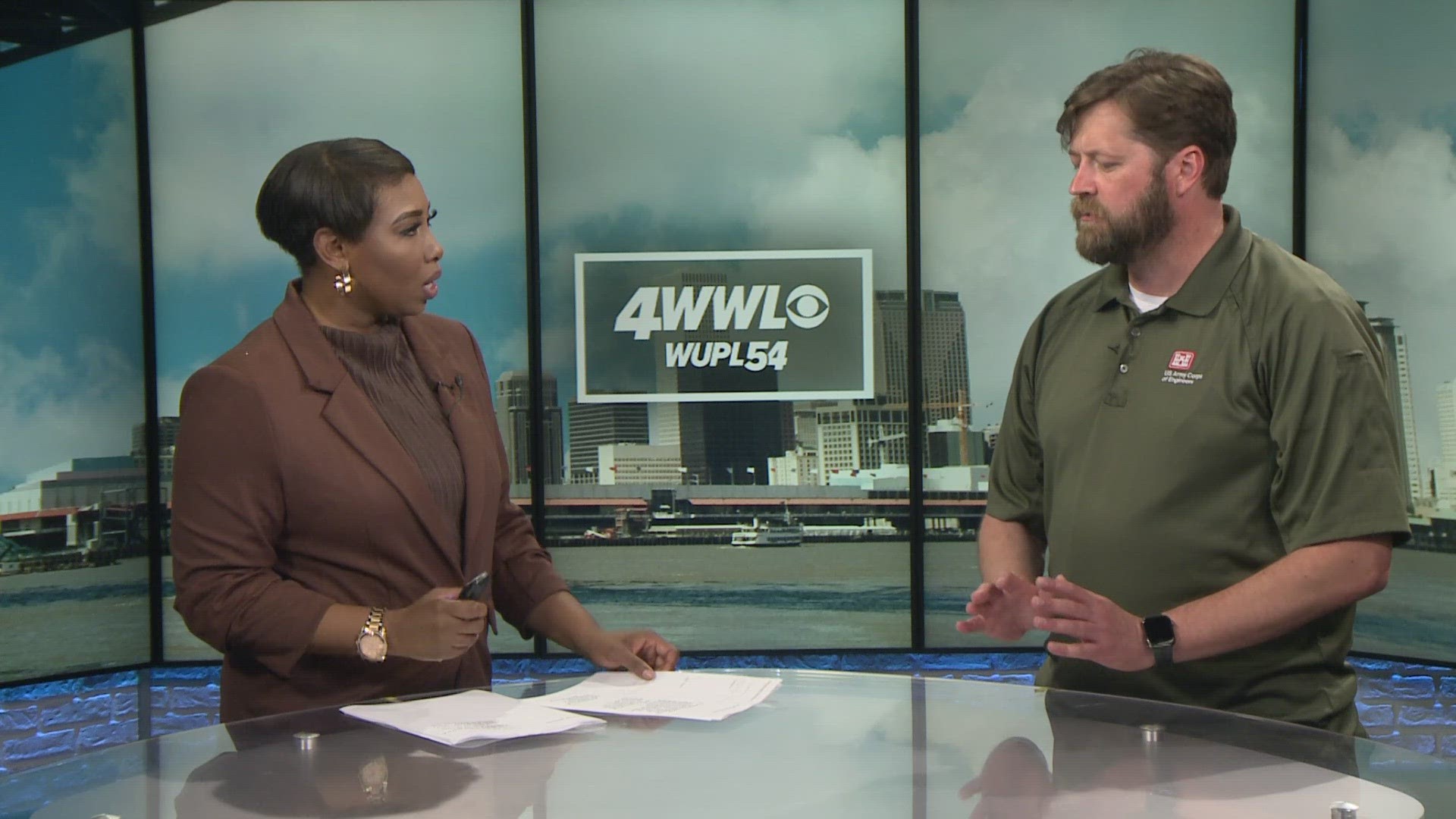WWLTV has been looking for answers to your questions about the saltwater intrusion. Here's some answers:
How do I know if my water is affected?
As of right now, lower Plaquemines Parish is the only area under a drinking water advisory. Local and state authorities will notify residents if and when their water is affected.
Does this impact the Northshore?
This won't impact people on the Northshore at all.
What can I do to reduce or eliminate salt from my drinking water?
In order to remove salt, it would need to go through reverse osmosis. Salt can't be boiled or filtered out using conventional filtration or other common store-bought water filters, such as Brita filters. Once your water system is affected, it is recommended to use bottled water or some other freshwater source, according to the Louisiana Dept. of Health.
What are the risks of consuming saltwater?
Saltwater can make drinking water unsafe, especially for people with kidney disease or high blood pressure, people on a low-sodium diet, dialysis patients, infants and pregnant women. The health effects of drinking saltwater have been found to be associated with cardiovascular diseases, diarrhea and abdominal pain, LDH said.
Should I be conserving water?
The Sewerage & Water Board of New Orleans said conservation practices are always a good idea and will become more important if and when saltwater intrusion becomes a factor, but for now, you aren't required to conserve water.
"Customers who would like to store extra drinking water in the event it's needed in the future can fill reusable containers with tap water now," SWBNO said.
Q: Is it safe to bathe and shower?
According to the New Orleans Health Department, yes it will be safe to bathe or shower in.
However, you may want to consult your healthcare provider or the state health department for specific precautions for vulnerable populations.
Q: Is it safe to do laundry?
We spoke to a local appliance expert, Broussard Appliance, who said it’s OK to use your washing machine.
Q: Is it safe to run my dishwasher?
Broussard Appliance said you can continue to use your dishwasher. There should be no problems with using water with high salinity.
Q: Is it safe to wash my car?
Salt is known to cause corrosion and rust on your vehicle. It’s always best to use fresh water when washing your car.
Q: Would a government shutdown affect the battle against the saltwater?
The Army Corps of Engineers says it will have no impact.
Q: How would this affect appliances?
Local appliance expert, Broussard Appliance, says the main appliance you need to be concerned about is your refrigerator. They recommend that you turn off your fridge’s ice maker and stop using the water in the door. Other, external, ice machines shouldn’t be used until the water is safe to drink.
Does salt corrode plumbing?
Over time, high levels of saltwater can cause damage to plumbing, appliances, cooling systems that use water, and water heaters, LDH said.
LDH recommends checking with your manufacturer, vendor or service provider for more information on specific equipment.
Can my pet drink salt water?
No. The health department recommends bottled water or some other fresh water source for pets.
When will the salt water be in my area?
The Army Corps of Engineers estimates it will be to Belle Chasse by Oct. 13, New Orleans/Algiers by Oct. 22, Gretna by Oct. 24, West Jefferson by Oct. 25, New Orleans/Carrollton intake by Oct. 28 and East Jefferson on Oct. 29.
These estimates are subject to change.
Also, just because the salt water has reached a certain point in the river, it doesn't mean that area's water will automatically be too salty to drink. Water is being tested and residents will be notified if it becomes unfit to drink.
Answers from Sewerage and Water Board of New Orleans official in interview with Paul Murphy:
Here are some answers from Steve Nelson, Deputy General Superintendent of the Sewerage and Water Board of New Orleans:
Nelson says they are tracking the saltwater wedge as it moves upriver daily. "We're getting those numbers in. And there's no circumstance under which we're going to turn off the water supply. We're going to provide pressure regardless of what the chloride concentration is coming in. So I just hope that folks understand that and we'll take that to heart that the water is and will remain safe to drink until there there may be an issue at which point we would advise the public well in advance,"
We're still weeks away from having to worry about any of this, correct?
That's correct. The end of October is the timeline we've been given by the Army Corps for our Carrollton intakes. And then the 22nd on or about for our Algiers intakes is what the Army Corps tells us could happen. And that's all dependent on rain. If we get rain up in the Ohio River Valley that can change the dynamics. But that's the date range for now.
What about this barge plan? The Corps has a plan to to eventually get up to 36 million gallons of water a day that would help dilute some of the water in the downriver treatment plants. Is the Sewerage and Water Board preparing the reservoir barge and other equipment that would be necessary to receive water from the corps?
Yes, we have a consultant engineer helping us right now working on that very setup for the Algiers plant. I believe that's a viable option for us. That's the best option we've got at the moment. We do have some backup considerations. But we are working on that reservoir barge and transfer setup right now. And the Corps tells us that they will have the capacity to be able to barge that water over for Algiers.
What about the Carrollton water plant that might be a little bit more difficult simply because of the size and scope of that treatment facility?
Yeah, the Carrollton water plant is more of a challenge because that plant treats between 130 and 150 million gallons of water a day. So we do have some options there that we're exploring. But barging is one that would just be a little too technically difficult, and there just isn't enough charging capacity for Carrollton. But we do have a couple of options that we're looking at there, too.
Can you talk a little bit about that knowing that these are still initial plans that are in the works? And how will you be able to dilute the water? The salinity in the water on such a big scale?
Yeah, we don't have specifics at this point. But on a big picture. We're looking at some potential pumping and piping options. But those are big picture big dollar requests that we're going to need a lot of federal assistance on. But we don't have specifics on that just yet.
Knowing that it isn't, there is no easy fix there. You can't bring in a reverse osmosis filter and have that take care of 146 million gallons a day facility? Is it am I oversimplifying it there or making it worse?
No, I don't think that's an oversimplification. But the good news is we've a number of regional partners we are in communication with daily. And we are hopeful that we will find a solution that will allow not just Orleans Parish but Jefferson. And then, by extension, we're working with St. Bernard. So I am confident that we have viable options on the table right now that we're going to work to provide that dilution factor so that we can continue to provide potable water.
So the focus would be to get water from upriver where the water has not been inundated with saltwater and then push it down from St. Charles St. John. St. James. Those were parishes up above us.
Yeah, that is that is the primary focus. It's just a matter of specifics on that. Yeah.
And what is your timetable for getting everything together?
We're gonna need a decision from the federal government here probably by the end of the week in order to be able to do something, something meaningful, but I am assured that we will have some decisions here shortly.
What would it take to do that? What type of infrastructure would you have to install on the fly to make that happen?
It would require a lot of capacity in terms of pumps and piping. As I mentioned, we have been in conversations with folks about how To make that happen, and we believe that it is a possible option,
Is going into some of the canals an option as well?
We've talked about that the canals aren't, aren't set up to transport that level of water, and then the pumps are all meant to pump in the other direction. Furthermore, we wouldn't really want to take up our stormwater conveyance capacity in the event that we did have heavy local rain.
The reverse osmosis is probably not the best fit, at least for Carrollton, correct?
Yeah, we've had discussions about reverse osmosis with a number of different groups, and simply the level of water production that we would need makes that an option that's not on the top of our list right now; it would be very difficult to achieve.
And are you in the process of getting the water intake pipes up higher in the river?
So we took a look at them. We've gone out and surveyed those intakes, especially on the Carrollton plant side, and those are already within the top five to 10 feet of the water column. The good news is we are only pulling off at the very top strata of the river. So, that's already been accomplished by the initial design.
Knowing that the salt water hugs the bottom and it's heavier than water. That would maybe give you a little more cushion regarding the salinity.
Yes, that's correct. We will be pulling off we are pulling off the freshest part of the river.
Anything else you want to pass along to your customers?
Yeah, absolutely be calm, be collected. We are working on options to be sure that we can dilute our water, and we're going to continue to provide water service. And don't panic; don't worry if you do feel like you need to save some water. Our water is currently safe to drink. So, if you want to use a reusable container, that's absolutely an option; there's no need to go buy pallets in cases of water. And we're, we're looking forward to and hoping and praying for rain in Ohio.
At some point, you ask your residents to conserve and in other words, to stop and put a pause on watering lawns and stuff like that. So you could serve the amount of drinking water that you can. Is that is that in the works?
Thank you for bringing that up. If we do get saltwater intrusion that reaches this level, that would be the time to look at conservation as it currently sits. We've got plenty of freshwater moving past and into our intake. So conference conservation right now isn't necessary, though water conservation is always a good idea. But at that point, if we did get to a place where we needed to dilute our intakes, we would absolutely be hoping and asking our ratepayers to be able to conserve so that every gallon that we conserve is a gallon that we don't have to dilute.
Plumber talks to Charisse Gibson about how saltwater can impact appliances:
Army Corps of Engineers official talks to Charisse Gibson about saltwater intrusion:
Ricky Boyett of the U.S. Army Corps of Engineers discusses the Corps' preparations for keeping water in southeast Louisiana parishes drinkable as the saltwater wedge moves upriver.
Boyett said we need about 10 inches of rain in the Mississippi River valley to get enough of a flow to push the wedge back out.
He said that once the salt wedge gets about 15 miles upriver of the water intake that's when there are concerns about impacts.
Currently only people in the southern half of Plaquemines Parish are affected and the wedge is slow moving, but it should reach the more populated areas like Belle Chasse, St. Bernard Parish, Algiers and then the city of New Orleans over the next month and a half or so.
For more information, visit the FAQ page on the state's website:
Text WATER to 504-529-4444 for the latest updates on the saltwater intrusion emergency.
► Get breaking news from your neighborhood delivered directly to you by downloading the new FREE WWL-TV News app now in the IOS App Store or Google Play.




